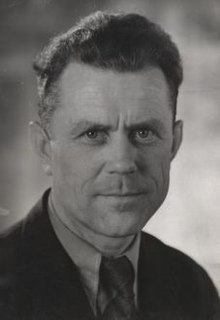
Back أكسل لارسن Arabic Aksel Larsen Danish Aksel Larsen German Aksel Larsen Finnish Aksel Larsen French 악셀 라르센 Korean Aksel Larsen NN Aksel Larsen NB Ларсен, Аксель Russian Aksel Larsen Swedish
This article needs additional citations for verification. (June 2015) |
Aksel Larsen | |
|---|---|
 | |
| Leader of the Socialist People's Party | |
| In office 1959–1968 | |
| Preceded by | Office established |
| Succeeded by | Sigurd Ømann |
| Leader of the Communist Party of Denmark | |
| In office 1932–1958 | |
| Preceded by | Thøger Thøgersen |
| Succeeded by | Knud Jespersen |
| Member of Folketinget | |
| In office 1932–1941 | |
| In office 1945–1972 | |
| Minister without Portfolio | |
| In office 5 May 1945 – 7 November 1945 | |
| Prime Minister | Vilhelm Buhl |
| Preceded by | Office established |
| Succeeded by | Office abolished |
| Personal details | |
| Born | 5 August 1897 Brændekilde, Odense Municipality, Denmark |
| Died | 10 January 1972 (aged 74) |
| Resting place | Fredens Kirkegård, Odense, Denmark |
| Political party | Socialist People's Party |
| Other political affiliations | Communist Party of Denmark, Social Democrats, Communist Party of the Soviet Union |
| Spouse | Gerda Larsen |
| Alma mater | International Lenin School |
Aksel Larsen (5 August 1897 – 10 January 1972) was a Danish politician who was chairman of the Communist Party of Denmark (DKP), and chairman and founder of the Socialist People's Party. He is remembered today for his long service in the Communist Party of Denmark, for his time as a concentration camp inmate at Sachsenhausen, and for being the founder of the Socialist People's Party.
Initially a Social Democrat and then a Trotskyist, Larsen came to support Stalinism, and defended the Soviet Union's policies during the early and middle parts of his career. He became leader of the Communist Party in 1932, and was elected to Folketinget (the lower chamber of Danish parliament Rigsdagen) in 1932. Together with other Danish communists, Larsen had to go into hiding in 1941 when the Danish police began arresting all party members. After the liberation at the end of World War II, Larsen became a minister in the liberation cabinet and subsequently led his party to its best-ever result in the 1945 election, in which it took one in eight votes. The election, however, resulted in a Liberal government, and Larsen's party was mostly shunned by the other party leaders.
After the Hungarian Revolution of 1956, Larsen condemned the Soviet Union's action. This led him into conflict with the members of the party leadership who had a greater loyalty to Moscow; a conflict that ended with his expulsion in November 1958.[1] Larsen's reaction was to establish the Socialist People's Party (Socialistisk Folkeparti, abbreviated SF), which, thanks to Larsen's personal popularity, entered parliament at the 1960 election at the expense of the Communists, who from then on played only a very peripheral role in Danish politics.
Larsen himself was highly respected among politicians, especially in his later years, even if his party was seen as somewhat irresponsible. He was the leader of the Socialists until 1968 when he handed this over to Sigurd Ømann, and he remained an MP until his death in 1972.
In 2005, the Danish Institute for International Studies concluded that Larsen held a secret working relationship between 1958 and 1964 with one of Denmark's allied partners in the Cold War, stating that "Larsen... obviously was an agent of a Western intelligence service."[2]
- ^ "Danish Reds Expel Leader from Party". The New York Times. November 16, 1958.
- ^ "Denmark During the Cold War: Highlights of the DIIS report" (PDF). Danish Institute for International Studies. June 30, 2005. p. 3. Archived from the original (PDF) on February 7, 2012. Retrieved June 21, 2015.
© MMXXIII Rich X Search. We shall prevail. All rights reserved. Rich X Search